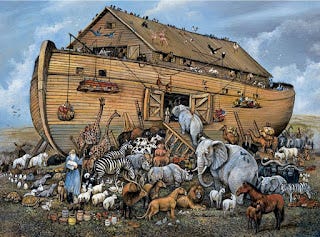Flying Kangaroos or Damnation

What do you have to believe in, so as to be a good Jew? According to Rabbi Moshe Meiselman, flying kangaroos. Otherwise, you're a kofer.
In the past, I have detailed all kinds of problems with Rabbi Meiselman's abominable Torah, Chazal and Science. There is the omission of sources that inconveniently refute his approach, the obfuscation of clear topics, the wholesale dismissal of traditional and reasonable interpretations of the Sages' words, the intellectual contortions, and so on. In this post, I will be dealing with an aspect of his book that is a combination of bizarre and dangerous - his approach to the topic of the Deluge.
There are all kinds of challenges with a literal interpretation of the Flood story. Yet, amazingly, Rabbi Meiselman presents many challenges that the average person might not even think of! He points out that keeping many of these animals in an ark for a year is an impossible task. It would strain the resources of a zoo with a large staff and modern technology - it would simply be impossible for a single family, with limited resources, to provide the animals with all the care and food and sensitive environmental conditions that they require.
Why would he raise such issues? Because Rabbi Meiselman wants to make the point that there is simply no way to make the account of Noah's Ark make sense from a naturalistic perspective - and therefore one must accept that it was entirely miraculous. Accordingly, one should not seek at all to try to make it fit with what is possible. "Within such a context, one does not bother counting the miracles; it makes no difference whether there were ten or a hundred."

And so everything was a miracle. The animals were supernaturally transported from all over the world to the Ark - the kangaroos flew in from Australia, the sloths from South America. Noah moved like the Flash to be able to look after them all. The waters of the Flood came from nowhere, they were boiling hot, and destroyed all life on Earth. And the entire world - all the civilizations and all animal life - were subsequently repopulated from the occupants of the Ark, again supernaturally transported back to their original homes.
Now, the truth is that even if one were to posit such extraordinary supernatural miracles, this does not at all solve the scientific difficulties with the simple interpretation of the Flood story. After all, the challenges from science are not just that it couldn't happen in such a way; they are that it didn't happen in such a way.
There are two sets of such challenges. One is from the various natural sciences, which do not show any tremendous turmoil 4000 years ago - there are trees older than that! Rabbi Meiselman attempts, utterly unconvincingly, to dismiss the reliability of such branches of science. He also suggests that maybe God miraculously made the geology of the world look exactly like no Flood had occurred - not to fool us, he adds, but for an unknown purpose(!).

Then there are the challenges from human archeology and anthropology, which Rabbi Meiselman simply dismisses out of hand as unreliable, "soft" sciences. Clearly he has never remotely studied the histories of numerous ancient civilizations - Andean civilizations, Chinese civilization, Mesopotamian civilization, Egyptian civilization and others - all of which continued uninterrupted during the entire period. There is clear evidence of cultural and even genetic continuity. (And Rabbi Meiselman doesn't even attempt to say whether they all originated from Noah's descendants, or whether they existed before the Flood and subsequently Noah's descendants moved to those regions and redeveloped those exact same civilizations and genes in the exact same places.) He is arguing from a standpoint of utter ignorance.
But let's leave all this aside for now.
It's also true that Rabbi Meiselman is going against the approach of many of Chazal and the Rishonim. They did not seek to make the Flood impossible to reconcile; they sought to explain how it was practically possible (within the constraints of what they knew about the world). The Gemara details how Noah brought the right kind of food for each animal. Ramban explains that the Ark was extremely large, rather than simply miraculously containing everything, because God tries to work within nature as much as possible. Rambam explicitly stresses that one should try to reconcile Torah with the naturally possible as much as one can (a source that Rabbi Meiselman utterly distorts in a footnote on p. 555). The issue for them was not whether Hashem can break the laws of nature; it was whether he does.
But let's leave that aside for now, too. Instead, I would like to focus on a different point.
Many years ago, when I was preparing my book The Challenge Of Creation, I had an entire chapter dedicated to showing in great detail why the approaches of people such as Gerald Schroeder and Nathan Aviezer simply don't work. I explained how they are thoroughly distorting the meaning of Hebrew words, ignoring crucial aspects, and not remotely solving the conflict between Genesis and modern science. I wanted to thoroughly demolish these approaches, such that people would then be forced to accept the approach that Genesis is a theological text that is not to be reconciled with science.
However, before publishing the book, I showed the manuscript to the late Rabbi Dr. Yehuda (Leo) Levi. And he convinced me to massively cut down this section of the book. His reasoning was as follows: No matter how authentic and valid I think that my approach to Genesis is, there are many people who simply won't be able to accept it. And if I've destroyed their ability to accept the approaches of Schroeder and Aviezer, then I've left them with nothing.

These were wise words. I also implemented that approach with regard to the topic of Noah's Ark. It's an extremely challenging topic for many people. And so instead of telling people which approaches don't work and which do work, I chose instead to make a post listing a wide range of different approaches. And I've seen people at both ends of the spectrum act in the same way. I know of charedi anti-rationalist rabbinic leaders who decided not to object to rationalist approaches, because they realized that there are people who simply won't accept their approach, and those people need to have a home within Judaism.
Now, I can understand someone feeling that certain approaches simply cannot be reconciled with Judaism. And that's okay; nobody is expected to go against their convictions and say that something is compatible with Judaism if they feel otherwise. But is it really worthwhile, and is it even at all justifiable, to actively campaign to alienate people from Judaism? To make it as difficult as possible for people to believe something, just so that you can insist that it they find it hard to do so, then you can trash them as having "a mindset tainted by kefirah"?! Are you really disqualified as a Jew if you're uncomfortable with the idea that God made kangaroos fly and carefully arranged an overwhelming amount of evidence from geology, archeology, genetics, and other branches of science in order to make it look exactly like there was no Deluge - "for unknown reasons"?
The worst type of ignorant people are those who do not even realize that they are ignorant. Rabbi Meiselman dismisses all the many diverse branches of science which demonstrate that there was no global destruction of the world as being unconvincing - but he's never even studied them! And he also demands those who have studied them must be equally dismissive!
I don't know which is worse - the ignorance, the arrogance, or the plain lack of concern for people.
(If you'd like to subscribe to this blog via email, use the form on the right of the page, or send me an email and I will add you.)


